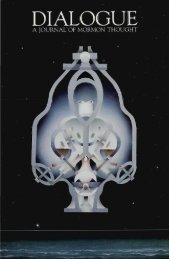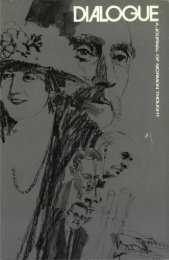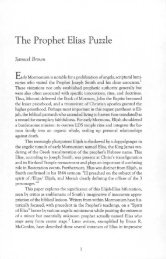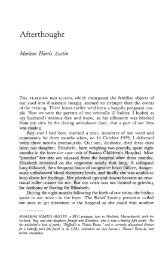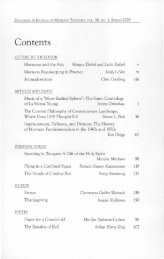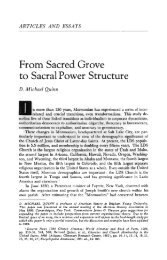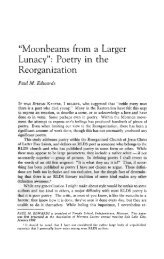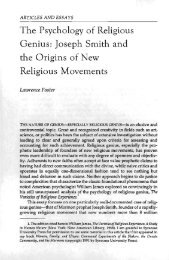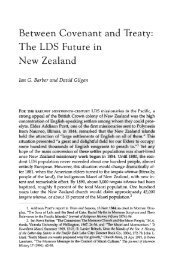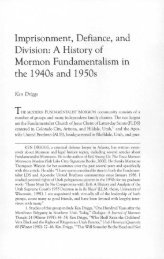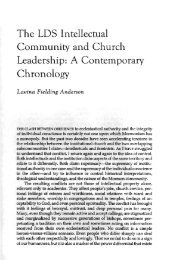Dialogue, Volume 25, Number 2 - Dialogue – A Journal of Mormon ...
Dialogue, Volume 25, Number 2 - Dialogue – A Journal of Mormon ...
Dialogue, Volume 25, Number 2 - Dialogue – A Journal of Mormon ...
You also want an ePaper? Increase the reach of your titles
YUMPU automatically turns print PDFs into web optimized ePapers that Google loves.
134 DIALOGUE: A JOURNAL OF MORMON THOUGHT<br />
One evening I felt particularly discouraged when I arrived at a<br />
shelter. David, a dynamic thirty year old going through the drug<br />
rehabilitation program, sensed my mood and asked how I was. I<br />
was taken aback, as I was usually the one to ask that question. But I<br />
found that I wanted to talk. I shared with David my feelings <strong>of</strong> loneliness<br />
and discouragement. In turn he told me how he had turned to<br />
Christ. While earning money as a pimp and drug dealer, he had come<br />
very close one day to killing a man. Realizing how corrupt he had<br />
become, he knew he had to change. Unemployed, illiterate, and drug<br />
addicted, he felt hopeless. As a first step toward change, he decided<br />
to learn to read. The tutor he found chose the Bible as their text.<br />
Almost immediately David began to read and then to recite verses.<br />
The more he read, the more evil habits he eschewed. He rejoiced in<br />
his change <strong>of</strong> heart, in Christ's infinite compassion, and in his opportunity<br />
to share his witness <strong>of</strong> his Savior's grace. And as he related his<br />
story, rich in metaphors lifted from Old Testament prophets, I felt as<br />
though God had sent me a modern-day psalmist to sing a comforting<br />
song <strong>of</strong> salvation.<br />
A month after our discussion, David moved to a halfway house<br />
where he could receive further treatment. A few weeks later, I called<br />
to arrange a visit. Much to my disappointment, I learned that David<br />
had relapsed and had been expelled from the program. There was no<br />
way to locate him, no way to know how he was. I could only have faith<br />
that his conviction and Christ's love would somehow continue to work<br />
a change in his heart.<br />
While such experiences move me deeply, nothing compares with<br />
the joy I feel as I watch my high school students serve in the community.<br />
Alone and in small groups, they tutor school children, visit guests<br />
at shelters, take care <strong>of</strong> children with AIDS, and volunteer at hospitals.<br />
Over the past five years, they have helped more than one hundred<br />
service organizations. These young people learn to consecrate their<br />
lives to others and mitigate their fears and prejudices <strong>of</strong> people whose<br />
economic status, education, health, nationality, and habits may differ<br />
from their own. I see my own capacity to listen, empathize, and counsel<br />
improve. I feel the power <strong>of</strong> Christ with me as I do this work. His<br />
fearless service and ministry —healing lepers, associating with social<br />
and political outcasts, forgiving an adulteress, asking a tax collector to<br />
be an apostle —made him unpopular and endangered him. His teachings<br />
and atonement, both evidence <strong>of</strong> his unconditional love for all <strong>of</strong><br />
his brothers and sisters, give us hope in our own striving for personal<br />
change and salvation.<br />
Most important, his example invites us to consecrate our lives to<br />
serving in order to help break such barriers as class, race, and nation-



